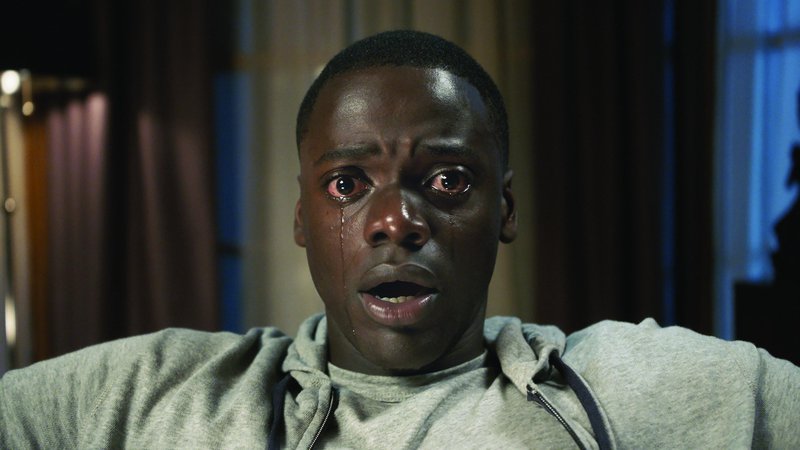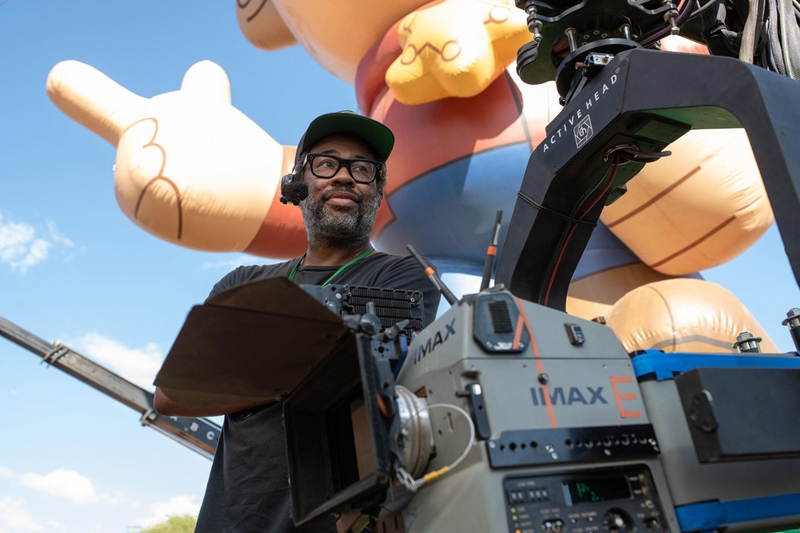The meteoric rise of Key & Peele funnyman turned frightmaster extraordinaire Jordan Peele is no fluke — Nope notches Peele's third consecutive #1 domestic debut in a "short" career already brimming with prestige. It's coming effortlessly to Peele, especially since navigating formulaic studio systems where other directors find themselves lost behind padded mainstream templates. When we inevitably debate our generation's counterparts to masters like Wes Craven, John Carpenter, and Tobe Hooper, Jordan Peele's catalog will be lauded alongside James Wan, and — well, that list remains wide open to interpretation. For today's purposes, I remain fixated on how Jordan Peele is blazing a red-hot trail as one of the most reliable contemporary "Event Horror" filmmakers despite the phrase "Event Horror" appearing less and less.
Nope's comparisons as a Spielbergian alien puzzler are everything we expected from Peele and nothing we could have predicted. Peele remains uncompromising regarding answerless unknowns and higher-concept storytelling that challenges audiences on grander scales — Spielberg compliments are based on skillful prowess as much as "Nope to Jaws" parallels. Nope is a searing condemnation of minorities lost to Hollywood's oppressive cruelty and the damage caused by tokenization underneath its extraterrestrial narrative. Peele tethers meticulously detailed nightmares to America's cultural ghosts, forgotten by years of whitewashed media representation, proving a massive appetite for storytelling differentiation despite producers still balking to "gamble" on shared tables in La La Land.

From Get Out to Us to this year's Nope, Peele's held a blowtorch to the feet of horror cinema by forcing audiences to participate in worlds where villains are metaphors or fantastical evils double as real-life atrocities. Jen Yamato does an excellent job informing LA Times readers how Nope's fictional Gordy isn't just some random sitcom monkey gone murderously feral — it's a direct reference to Travis the Chimpanzee, the Challenger explosion, and our disgusting relationship with spectacles. Richard Newby highlights on THR the tragedy of Steven Yeun's chewed-up, spit-out Ricky "Jupe" Park after child stardom and how Gordy's treatment highlights the nastiness of caucasian audiences using outsider Gordys and Rickys for entertainment — then putting a bullet in their head, proverbially or literally, once done.
That's not to say horror's never been confrontational, satirical, or commentative — horror has always been political and prone to protest. It's more how Peele has proven that Black creators can thrive given the budgets, resources, and freedoms to tell their stories on the grandest stage. Get Out shattered a barrier, but the influx of underrepresented voices in mainstream horror has still been a trickle. Many victories are attributed to Peele's company Monkeypaw Productions, opening doors for creators like Nia DaCosta to revamp Candyman. Meanwhile, it's still on smaller streamers like Shudder to release bombshell international titles such as La Llorona or Tigers Are Not Afraid. What Get Out, Us, and Nope all have in common is how differently they present than most other theatrical horrors in a market driven by Wan's The Conjuring Universe, prototype remakes, or requels/rebootquels that are all the rage. Peele has been feeding our appetites for unfathomably original theatrical horrors by leading the genre with new ideas, not following in footsteps treaded dull by the same ghouls and slashers over generations.
Nope unveils Peele as a chameleon, sliding between horror subgenres like there's no difficulty curve. Peele's silver screen Twilight Zone modernization makes more contextual sense given Nope's reveling in American UFO obsessions, dashing in Lovecraftian existentialism with his billowing balloon-like entity. He's able to bend horror to his thematic will while still adhering to viewer expectations, given how the otherwise adventurous sci-fi westerner Nope includes multiple crowd-pleasing scares — shout out to the Jupe crew during a magnificent corral fright. Peele wants to speak volumes with Nope but doesn't cheat audiences who are there to hoot, holler, and gasp along with the characters on screen.

There's absolutely an indulgence to Peele's storytelling that layers thick like a triple-decker sandwich that won't fit in your mouth. Still, it's never destructively selfish or disrespectful to the genre. Jordan Peele is a horror lover first, creative activist second (by centimeters), but always respectfully thoughtful to the audience's needs.
Mr. Peele comes off as a thick-skinned comedian who can laugh at his own concepts via dialogue — "How exquisitely stupid is that?" — with the confidence to know they're anything but moronic. Peele's so proficiently observant that he gets real-life celebrity vloggers to post profoundly ignorant tweet threads which exemplify the motifs and behaviors warned against in Get Out, Us, and Nope. It's eerie. There's foresight to his works that gaze futuristically like a hidden third eye.
Nope also magnifies the varied talents in Peele's directorial arsenal, from his ability to provoke situationally mesmerizing performances to top-tier instincts over soundtrack choices. Of course, credit goes to Daniel Kaluuya, Keke Palmer, Steven Yeun, and others who give Peele their A+ game, but it's also on Peele to utilize his ensembles as horror characters who aren't stereotypes. Peele coaxes out Palmer's lovable hustler energetics as Emerald and Kaluuya's hundred-yard-stare as woefully exhausted OJ, still able to find the humor in alien abductions as OJ mutters, "nope." The portrayal of OJ is a testament to Peele's alternative thinking in these scenarios, allowing Kaluuya to act naturally instead of forcing hammed-up fearfulness or frantic emotes as we've seen failed horror actors force on cue. Peele is the master of fictional universes that abide by their own tropes and rules, bored by rigidly recycled retellings that inundate horror audiences about the same demons, same exorcisms, and same haunted architectures.

What's exciting about Peele's storytelling approach is there's so much to engage with at varying speeds. For base audiences, Nope can exist as an agoraphobic hunt-and-flee scenario about Haywood Hollywood Horses making the best out of a cloud-disguised monster. There's enough engagement baked into OJ's mystified dazes, bloody downpours, and the hungry cosmic visitor that you'll be alright. Details that arise like Haywood's ties to Eadweard Muybridge's "The Horse in Motion" and the first Black film star, OJ realizing if you don't look at the spectacle, it'll go away, or Jupe's SNL skit recap being more tragic than hilarious — no matter how Kattan's killing it — add another dimension atop already sturdy bones.

Peele doesn't leave viewers behind who aren't as keen to decipher his upright-standing shoes or prominent entertainment industry criticisms but also won't compromise his visions. Nope can be about a floating saucer beast who vacuums its meals; it can be a devastating encounter with heartless Hollywood practices that have left countless souls grasping to achieve fame for the first or last time — any option, or both, is successful.
I hesitate to isolate Peele in a class of his own — Scott Derrickson's The Black Phone, Ti West's X, and Radio Silence's Scream all reached theater audiences this year alone — but won't minimize the uniqueness under spotlights that Peele has accomplished. Peele's movies plant their flag, instigate with attitude, and thrive as financially impressive horror films that disprove outdated Hollywood preconceptions. Nope is as fearless as Get Out or Us, even without more "overt" socio-conscious themes, which never forgives systemic racism to-this-day at the core of current Hollywood's business model. Few filmmakers have distinguished their voices as rapidly as Peele, to the point where I can recognize a scene from his movies like hearing the opening riff of a Metallica track. Better yet? Peele's done everything his way, with no exceptions. That's a freedom that so many more creatives deserve. Still, at the moment, I'm just thankful we have someone as rapturously and radiantly expressive as Jordan Peele setting an example for the horror filmmakers of tomorrow.






